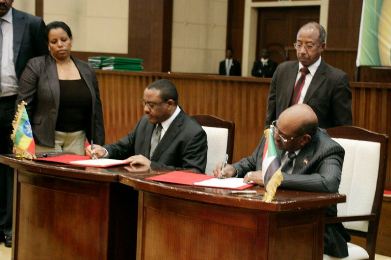Sudan’s support to Ethiopian dam is economically motivated: Bashir
December 4, 2013 (KHARTOUM) – The Sudanese president, Omer Hassan Al-Bashir, has said that his country’s approval for the construction of Ethiopia’s Grand Renaissance Dam was driven by economic not political reasons and asserted that Sudan would yield great economic benefits from the construction of the dam.

The Nile Tripartite Committee, now named the ‘International Panel of Experts (IPoE), is composed of six experts drawn from Ethiopia, Egypt and Sudan, and another four international experts.
Bashir , who addressed a public rally in Gedaref state, eastern Sudan, on Wednesday in the occasion of the inauguration of the power linkage network between Sudan and Ethiopia, added that Sudan supports all projects which benefit people of the region.
He emphasized that Sudan seeks to strengthen ties with Ethiopia through trade zones and development and infrastructure projects, pointing to the power linkage, communications, and railways projects which will be completed in the near future.
The Sudanese president also mentioned that Ethiopia’s electricity and dams projects will provide 200 megawatt of free electricity for Sudan, pointing that electricity generation from Upper Atbara and Setait dams would increase from 120 megawatt to 320 megawatt following the construction of the renaissance dam.
Addis Ababa was pleased recently by Khartoum’s support to the new dam project which will be erected near the Sudanese border, as Sudan used to support the Egyptian position in matters of Nile water.
In the nineties following the fall of Mengistu regime with the support of the Sudanese regime, the two countries aspired to enhance regional cooperation together with the new nation of Eritrea. But differences over Khartoum’s support to Ethiopian and Eritrean Islamists followed by Addis and Asmara border war hampered the tripartite project.
The Ethiopian prime minister, Hailemariam Desalegn, said that the power linkage project represents the beginning of the integration and cooperation projects between Sudan and Ethiopia.
He affirmed that his country doesn’t seek to achieve narrow interests from the major development projects but takes into account the benefit of all countries in the region.
Bashir and Desalegn signed on Wednesday the framework agreement on trade, economy, and technical cooperation between Sudan and Ethiopia at the end of the JSEHC meetings while foreign ministers signed the minutes of the higher committee meetings.
The two leaders also signed several agreements and Memorandums of Understanding (MOU).
The agreements included cooperation agreements on legal assistance in criminal issues, aviation services, local and decentralized governance, passenger services, security issues, and railways.
The MOUs included cooperation in areas of combating human trafficking, woman, youth, and children, banking, customs as well as the executive programs on youth and general education.
Speaking in a press conference held on Wednesday evening, Bashir that Sudan and Ethiopia agreed on establishing a free economic and trade zone on the common border, pointing that the trade zone would be equally split between the countries in order to attract investments from both sides.
He renewed Sudan’s determination to achieve peace and stability in the Horn of Africa, stressing that Sudan has always sought to resolve problems and tensions among countries in the region. He pointed that Sudan’s strong ties with Ethiopia and Eritrea qualify it play a role in removing tensions between the two countries.
Last year , tensions between Eritrea and Ethiopia escalated, mounting fears of renewed conflict, after the Ethiopian army carried out cross-border attacks on military camps inside Eritrea. The attack was in response to the killing and abduction of foreign tourists in January 2012 in Ethiopia’s remote Afar region by rebels allegedly backed by Eritrea.
The cross-border attacks by Ethiopian troops was Addis Ababa’s first and official military incursion since the two East African nations ended the bitter war in 2000 over the disputed town of Badme, which had been attributed to Eritrea by a UN border committee.
(ST)
